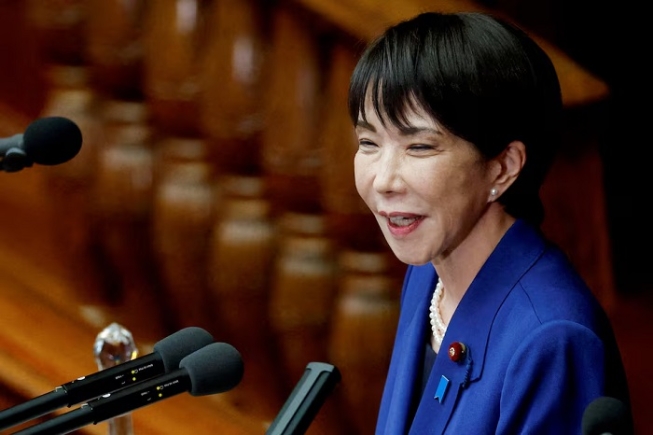
Japan seeks to calm escalating row with China over Taiwan
Japan moved on Monday to tamp down an escalating row with China over Taiwan that has prompted Beijing to urge citizens to halt travel to its East Asian neighbour.
The dispute erupted after Prime Minister Sanae Takaichi told Japanese lawmakers this month that a Chinese attack on Taiwan threatening Japan's survival could trigger a military response.
Her comments broke with past administrations' avoidance of public discussion of such a scenario, so as not provoke Beijing, which claims the self-ruled island.
Masaaki Kanai, the Japanese foreign ministry official in charge of Asia and Oceania affairs, arrived in the Chinese capital to meet his counterpart, Liu Jinsong, a video broadcast by the Kyodo news agency showed on Monday.
Kanai is expected to explain that Japan's security policy has not changed, and urge China to refrain from actions that damage ties, media said.
Taiwan is located just about 110 km (68 miles) from Japan's westernmost island of Yonaguni, near sea lanes on which Tokyo relies for energy shipments. Japan also hosts the largest concentration of U.S. military power outside the United States.
"Various channels of communication are open," Japan's Chief Cabinet Secretary told a regular press briefing, when asked about Kanai's visit.
"We have made a firm request for the Chinese side to take appropriate steps," he said, adding that the travel warning was incompatible with efforts to promote strategic, mutually beneficial ties.
China's Premier Li Qiang has no plans to meet Takaichi on the sidelines of this week's G20 summit in South Africa, however, the foreign ministry said in Beijing.
Instead, Japan should retract its "wrongful" remarks, ministry spokesperson Mao Ning told a regular news briefing.
Taiwan President Lai Ching-te said China was carrying out a "multifaceted attack" on Japan, speaking to reporters in the capital's sister city of New Taipei.
"I call on the international community to continue paying close attention and I also urge China to exercise restraint and demonstrate the conduct befitting a major power, rather than becoming a troublemaker for regional peace and stability," he added.
Tension could persist for months, however, said Kenji Minemura, a senior research fellow at the Canon Institute for Global Studies.
"China knows that Takaichi can't retract her comment, so its call for one isn't to get a resolution, but to ramp up pressure on Japan," he said.
LEISURE, RETAIL TAKE A HIT
The row flared with Takaichi's comment on November 7, a week after she met Chinese President Xi Jinping and agreed to pursue stable ties.
A day later, in a now-deleted post on X, China's consul general in Osaka, Xue Jian, said "the dirty neck that sticks itself in must be cut off".
Japan summoned China's ambassador to protest his "extremely inappropriate" statement and several Japanese politicians called for Xue's expulsion.
The rift widened on Thursday, when China summoned Japan's ambassador, for the first time in more than two years, to make a "strong protest" over Takaichi's remarks.
On Friday, China said Japan would face a "crushing" military defeat if it intervened over Taiwan and voiced "serious concerns" about Japan's security direction.
This included ambiguity over its three non-nuclear principles not to develop, possess or host nuclear weapons.
In August, a Reuters investigation had found growing willingness in Japan to ease those pledges, long a taboo in the only nation to suffer atomic bombings.
On Sunday, Chinese coast guard ships sailed through waters around a group of East China Sea islands controlled by Japan but claimed by China.
Known as the Senkaku in Tokyo and the Diaoyu in Beijing, they have been a flashpoint since Japan nationalised them in 2012. Japan's coast guard said it drove the Chinese ships away.
Japan said it also scrambled fighter jets on Saturday, after China flew a drone between Taiwan and Yonaguni.
George Glass, the U.S. ambassador to Japan, has also waded into the dispute, criticising Xue on X.
On Saturday, he said it was time to move on, adding, "Halloween has been and gone," after the Chinese diplomat labelled Takaichi an "evil witch".
Chinese state-linked media also targeted Takaichi on Monday.
In an editorial, the People's Daily of the ruling Communist Party said, "Takaichi's dangerous remarks, which have touched the nerves of all parties, were not only strategic recklessness, but also deliberate provocation."
If the row drags on, a drop in Chinese visitors, such as the fall of roughly 25% seen during an island dispute in 2012, could deliver a significant economic hit for Japan, said Takahide Kiuchi, executive economist at Nomura Research Institute.
"A drop in visitor numbers on this scale would have a dampening effect exceeding half of Japan’s annual growth," he said.
Worries about such a hit caused a dip in tourism-sensitive shares in Tokyo, with department store operator Isetan Mitsukoshi falling 11.3%, while Japan Airlines gave up 3.7%.
